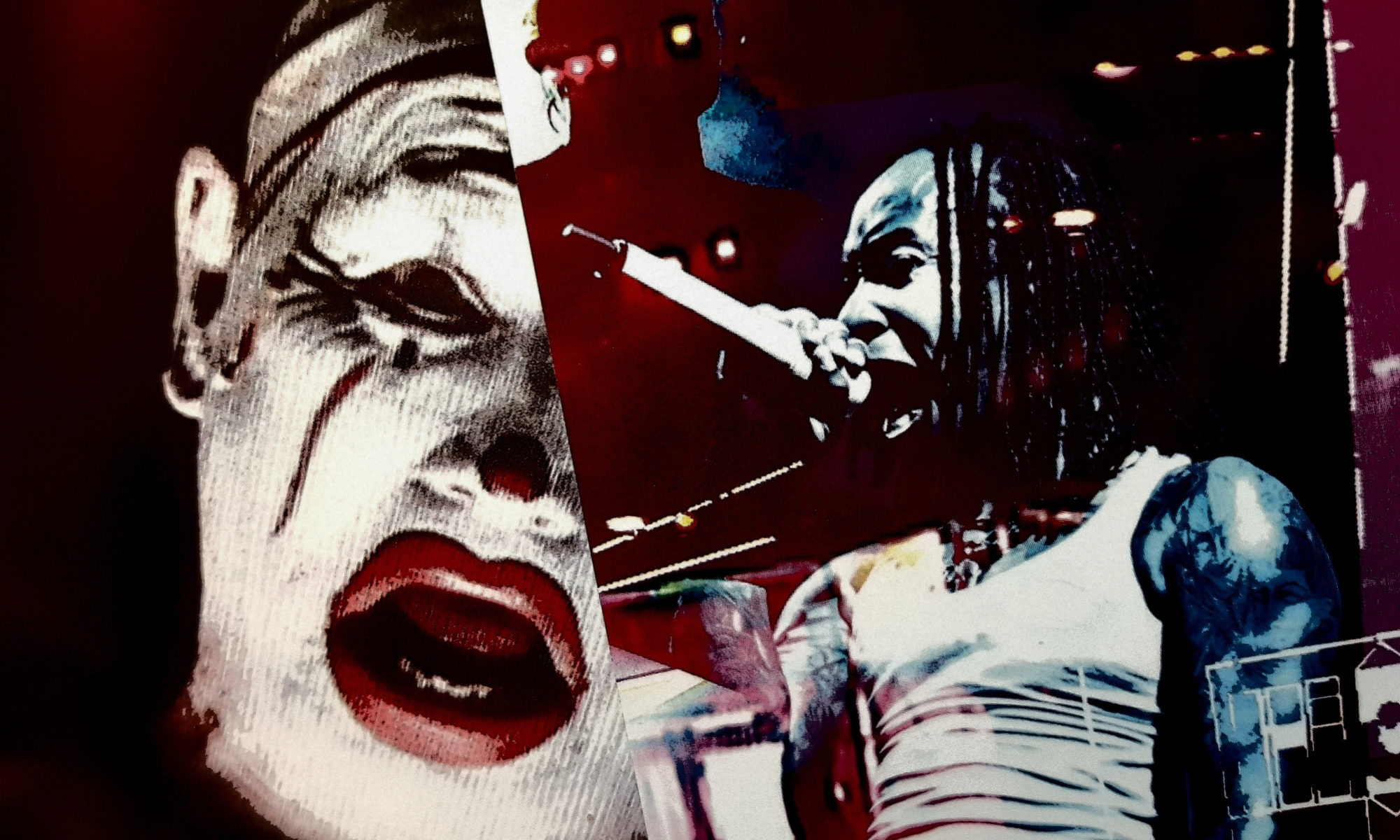Bei einem Konzert live dabei zu sein ist ein besonderes Erlebnis – vor allem, wenn »The Prodigy« oder »The Chemical Brothers« auf der Bühne ein audiovisuelles Feuerwerk starten. Im Mittelpunkt stehen dann Tanz, Rock, Party, Genuss und Rausch. Aber was wird aus diesem Erlebnis, wenn Live heißt, dass es ein Film ist?
Liam, Keith und Maxim von »The Prodigy« äußerten sich einmal so, dass die Band keine Live-Aufnahmen mehr veröffentlichen werde, denn es würde an dem fehlen, was das Essential der Show ist: Atmosphäre. Stattdessen sollen die Studio-Alben vielmehr nur die Soundtracks für die Live-Shows sein – eben derart, wie auch ein Film-Soundtrack nicht den ganzen Film widerspiegelt. Eine Show oder ein Kinofilm sind im Original zu erleben. Seither hat sich aber etliches getan, sowohl technologisch als auch in den Einstellungen. Keith Flints simple Aussage aus den 1990ern – »Fuck Internet« – ist inzwischen überholt und die Band hat sich das Netz zu Eigen gemacht. Bisheriger Höhepunkt ist, dass die Jungs eine Live-DVD mit einem Auftritt vor 60.000 Menschen im Milton Keynes Bowl herausgebracht haben.
Der Konzertfilm bietet auch genau das, was man von einem Live-Mitschnitt dieser Band erwartet – eine audiovisuelle Bombe. Wie in einem Dokumentarfilm wird das gesamte Spektakel von A bis Z eingefangen. Die Film-Schnitte sind nicht verspielt und wollen nicht wirklich eine eigene Stimmung hervorrufen. Stattdessen verlässt sich die Regie in der Inszenierung darauf, dass die Elektro-Punk-Rock-Atmosphäre von Band und Fans unmittelbar alle Karten ausspielt. Und während man die Zuschauermasse aus der Vogelperspektive beobachtet, erlebt und sich gleichzeitig von den Showmastern auf der Bühne animieren lässt, geschieht das zuverlässig.
»Don’t Think« von »The Chemical Brothers« bietet hingegen etwas ganz anderes, denn es geht nicht nur um die Abbildung des Konzerts beim Fuji Rock, sondern es werden vielfältige Elemente und Aufnahmen miteinander vermischt. Das wirkt umso intensiver, da immer wieder Mario Kobayashi Stopford, die von Kameras begleitet wurde, in kurzen Zwischenschnitten eingeblendet wird. Dadurch erhält der Film ein zusätzliches narratives Element und als Zuschauer erlebt man das Geschehen unmittelbarer, da man in diesen Augenblicken neben Stopford steht und an deren Erleben teilhat. Vielmehr noch wird auch die zeitliche Struktur des tatsächlichen Konzertes wie im Rausch aufgelöst und zur Nebensächlichkeit – selbst wenn die einzelnen Tracks in der richtigen Reihenfolge ablaufen. Aber »The Chemical Brothers« glänzen auch mit einer anderen Lichtershow als »The Prodigy«, denn hier wird über verschiedene Lichtelemente – wie die Darstellung von tanzenden Figuren – ein weiteres Narrativ eingebracht. Manchmal liegt genau das auch unmittelbar im Fokus der Kamera und stellt für den Zuschauer eine noch ansprechendere Symbiose aus den sicht- und hörbaren Dingen dar. Der Konzertfilm bleibt also nicht mehr nur Beobachtung aus der Distanz heraus. Die Sprunghaftigkeit und die Vielfalt der Szenerie entfalten ein ganz eigenes und lebendiges Erlebnis und lassen den Film nicht nur Abbild oder Soundtrack sein.
Der Bass dröhnt und hämmert bei beiden Bands durch die Boxen, aber bei aller Begeisterung die man entwickelt, bleibt es nur ein anderes Erlebnis. Zwar ist es kein schlechtes, aber es lässt sich nicht mit der Erfahrung vergleichen, inmitten der Massen zu stehen, die Vibrationen vom Bass am eigenen Leib zu spüren – ebenso wie auch Erschöpfung, Gelassenheit und Freude. Und hier stößt Film stets an die Grenzen, denn in der Abbildung von etwas bleibt es gleichzeitig auch immer nur die Vorstellung von etwas. Andererseits hält Film eine ganz eigene Erfahrungswelt bereit, die man auch nicht missen möchte. Diese Konzertfilme sind zumindest großartige Soundtracks und Werbefilme für die Live-Erlebnisse. Die Aussage von »The Prodigy« hat also weiterhin Gültigkeit. Die Show lässt sich inzwischen nur besser einfangen – zumindest so, dass es Lust auf mehr macht: Live.
Being at a concert is a great experience – especially, if it’s »The Prodigy« or »The Chemical Brothers« who burn down an audiovisual extravaganza on stage. If so, it’s all about dance, rock, party, pleasure and states of euphoria. But how is this experience going to change, if live means that it’s just a movie?
Liam, Keith and Maxim of »The Prodigy« once said that the band won’t release live-recordings anymore, because these would lack what is essential to their shows: Atmosphere. Instead, the studio recordings should be seen as the soundtracks to the live shows – just like a motion picture can’t represent the movie altogether. Shows or movies have to be watched in their original surroundings. But since then, many things have been changing, both from a technological and individual point of view. Keith Flint’s simple statement from the 1990s – »Fuck Internet« – is outdated and the band actually got used to the Internet. So far, the climax was marked by the release of a DVD containing the recording of a gig in front of 60.000 people at the Milton Keynes Bowl.
This movie shows what you’d expect from a live recording of this band – it’s an audiovisual bomb that goes off. Like in a documentary, the whole spectacle is caught on tape. The cuts are not playful and don’t want to evoke a special kind of atmosphere. Instead, the direction lowers the use of editorial staging devices and leaves it to the electro-punk-rock-atmosphere created by the band and the fans to make impacts. The movie affects the viewers while they’re watching the audience from a bird’s-eye view and getting caught and excited by the headliners on stage.
»Don’t Think« by »The Chemical Brothers« offers something entirely different, because it’s not just about documenting and replaying their gig at Fuji Rock, it’s much more about mixing different elements and recordings with another, thus creating something new. The impact of it gets more and more significant because of the presence of Mario Kobayashi Stopford, who was accompanied at the concert and is constantly shown within intercuts. This serves as an additional narrative element and, while supposedly standing next to Stopford and taking part in her experience, the audience is sucked right into the action. Furthermore the temporal structure of the actual event dissolves like in a state of euphoria and becomes irrelevant – even if all tracks are played in their right order. But »The Chemical Brothers« also shine with a whole different light show than »The Prodigy« because they play with different visual elements – like in portraying dancing figures – thus introducing another narrative element. Sometimes these elements get into the focus of the camera and as a symbiosis of visible and audible elements it all becomes more appealing. Thus the concert movie doesn’t remain a document of observing from the distance. The rapid style and variety of the scenery unfold a vivid live-experience that goes beyond being just a documentary or a soundtrack.
No matter which of these bands you’re talking about, the bass booms and pounds through their loudspeakers, but regardless of all this enthusiasm, these movies just remain as another form of experience. Indeed it’s not a bad one, but you can’t compare it to standing in the middle of the audience, feeling the vibrations with your body, coming from the bass – as well as exhaustion, composure and pleasure. And that’s where film comes to pushing the boundaries, because as a depiction of something it just stays the imagination of something. Film, on the other hand, offers a whole different experience that one doesn’t want to miss either. At least these concert movies are terrific soundtracks and advertisements for the live shows. The statement given by »The Prodigy« is still strong. The recording technique for a show just got better – at least as far as it whets the appetite for more: Live.

